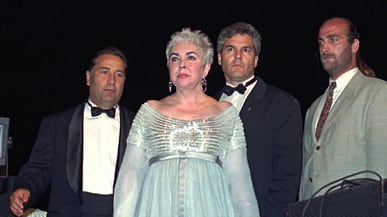Lost in the tributes to the Hollywood icon—her beauty, her acting, her AIDS activism—is her work to help Chechen orphans. Thomas Goltz on the extraordinary turn of events that focused her on the war-torn Russian republic. Plus, full coverage of Elizabeth Taylor.
I never knew Elizabeth Taylor. But the one real memory of her that has astounded and perplexed me for over a dozen years was her extraordinary commitment to the Chechens.
Yes, reader, you read that right— Chechnya.
The year was 1996, and the first horrible Russian-Chechen war had ground down to an awful, gasping cease-fire that both sides declared as a temporary victory. A plethora of interested parties charged into this hiatus to take control. In addition to veiled pro-Moscow elements, there were hard-core Islamists, moderate nationalists, and finally “Chechen traditionalists,” which is where Taylor fit in.

Bear with me, dear reader.
During the so-called independence period between September 1996 and the renewed Russia occupation starting in December 1999, Chechnya had become an exceedingly dangerous place—as it still is now. Mysterious gangs kidnapped and often killed hostages at random in the most horrible manner, even after ransoms were paid; arguably the most gruesome was the beheading of four British Telecom workers, whose severed heads were left “like salutary Halloween pumpkins,” in the words of former NPR correspondent Lawrence Sheets, along the side of a major road. Another mass crime at the time was the slaughter of half a dozen Red Cross workers in their beds, once again by “unknowns.” That crime remains unsolved to this day—and was followed by scores more of political murders, or “disappearances.”
Into this lurid scene waltzed Elizabeth Taylor.
The Istanbul-based “Chechen Foreign Ministry,” run by a curious gaggle of individuals who are now all dead or underground, decided that they needed a star-driven relief effort for the many, many Chechen orphans spawned by the first Russian-Chechen war of 1994-96, and thus started a search for international talent to attract even more attention to the well-documented atrocities of the conflict.
There were many names approached, but who stepped up to the plate?
Elizabeth Taylor.
The plan was set to transport the star of Cleopatra and Who’s Afraid of Virginia Woolf? to a safe house in Baku, from which she would be smuggled across the Russian frontier through dangerous Dagestan and then be brought, incognito, to shattered Grozny, where she would make her plea for Chechen orphans.
Bizarre?
Yes. Her front person was Saudi financier Adnan Kashogi’s third (second? Fourth?) wife, whose name I do not recall.
Michael Jackson pal and Hollywood icon Elizabeth Taylor emerging from the back seat of a car in firebombed Grozny for a do-gooder photo-op for no money?
Crazy?
Absolutely. Michael Jackson pal and Hollywood icon Elizabeth Taylor emerging from the back seat of a car in firebombed Grozny for a do-gooder photo-op for no money?
Well, yes...
Everything was all set—and then Taylor was brought low by brain cancer, and the Grozny reception called off. But her new devotion to the Chechens was not.
Photos: Elizabeth Taylor’s Life

With a shaven head, a year later she showed up at a packed, $1,000-a-plate charity dinner for her Chechen kids at an ultra-luxurious hotel on the Istanbul Bosporus, along with her “sidekick,” Julio Iglesias.
I started to draft a film script about the Istanbul Taylor event and the history behind it, but stopped when I realized that no one would believe me. In my mind’s eye, I had even cast my pal Margot Kidder for the lead role. Maybe that will still happen, but for the time being all I can say is: Rest in peace, Elizabeth, and let the various real memories come forth about your larger-than-life personality, talents, concerns, and commitments.
I never met you, but for what it is worth, the Chechens and I will never forget.
Thomas Goltz is the author of numerous books and articles on the post-Soviet Caucasus, the most recent being the updated Georgia Diary (M.E. Sharpe, 2009). When not on the road, he teaches in the department of Political Science at Montana State University in Bozeman. Please visit the web site www.msubsec.com for recent academic adventures.






